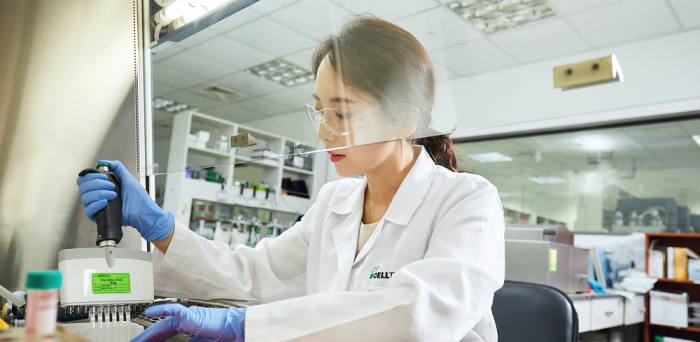
South Korea’s leading biosimilar drug developer Celltrion Inc. on Sunday unveiled an anticancer medicine to expand new pipelines and transform into an original drug developer.
Celltrion said it and Abpro Holdings Inc., a US biotechnology company, announced preclinical data for ABP-102/CT-P72 in an oral presentation at the American Association for Cancer Research (AACR) Annual Meeting 2025.
ABP-102/CT-P72, a tetravalent bispecific HER2 x CD3 T-cell engager developed by Celltrion and Abpro, is engineered to selectively target HER2-overexpressing tumors while reducing the risk of on-target, off-tumor toxicity in normal tissues, the two companies said.
HER2, or human epidermal growth factor receptor 2, is a type of tumor marker. CD3, or cluster of differentiation 3, is a protein complex and T cell co-receptor that is involved in activating both the cytotoxic T cell and T helper cells. T cells, also known as T lymphocytes, are a crucial part of the immune system responsible for cell-mediated immunity.
Preclinical findings presented at AACR suggest the potential of ABP-102/CT-P72 to surpass existing HER2-targeted therapies in both efficacy and safety, according to the two companies.
TO TREAT HER2-POSITIVE CANCERS
HER2-positive cancers represent up to 30% of all cases of breast, gastric, pancreatic, colorectal and other forms of cancer, Abpro said in a statement.
“ABP-102/CT-P72 represents a breakthrough in the bispecific antibody space, addressing the long-standing toxicity barriers that have hindered the development of HER2-targeted T cell engagers,” said Celltrion Senior Vice President and Head of the New Drug Division Lee Soo Young.
“The strong preclinical efficacy and safety data support its potential to redefine treatment options for patients with HER2-positive cancers.”
Celltrion and Abpro plan to start clinical trials of ABP-102/CT-P72 in the first half of 2026.
The two companies joined forces in 2022 to develop bispecific antibody therapies for HER2-positive cold tumors.
“Based on those results, we aim to accelerate the development of multivalent antibody therapies while targeting the next-generation anticancer drug market,” said a Celltrion official in a statement.
By Woo-Sang Lee
idol@hankyung.com
Jongwoo Cheon edited this article.















